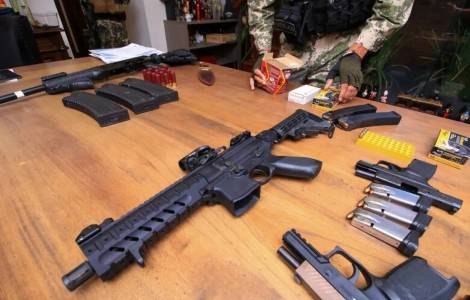
Asunción (Agenzia Fides) - "The group was very well organized, had assault rifles and military pistols, but also machine guns and anti-aircraft ammunition, armored vehicles, hand grenades and bulletproof vests; everything that a regular army of a country has," said Jalil Rachid Segovia, executive secretary of the Secretaría Nacional Antidrogas (SENAD) of Paraguay in announcing the dismantling of a criminal organization that operated between Paraguay and Brazil.
The dismantled organization was responsible for drug trafficking and the murder of Paraguayan and Brazilian police officers and members of rival gangs in conducting the illegal trade.
Paraguay has long been a major transit point for trafficking drugs from Argentina, Bolivia, Peru and Colombia to the rest of the world, and weapons from the United States and European and Asian countries to Brazil and other Latin American
states.
Drug trafficking is mainly carried out by Brazilian gangs, such as the Primeiro Comando da Capital (PCC) and the Comando Vermelho, which have long had a foothold in Paraguay.
As for the arms trade, they are more or less legally imported from Paraguay and then smuggled into neighboring countries starting from the Triple Border area, where the borders of Paraguay, Argentina and Brazil converge in the cities of Ciudad del Este, Puerto Iguazú and Foz do Iguaçu.
“Operation Dakovo”, which began on December 5, 2023 with 20 raids in the Brazilian state of Paraná, 20 raids throughout Brazil (in six other states) and one raid in the US state of Kansas, led to the discovery of a company, International Auto Supply S.A. (IAS), which is believed to have purchased firearms, rifles, machine guns and ammunition worth around USD 242 million from companies in Croatia, the Czech Republic, Slovenia and Turkey. Further investigation by authorities in Asunción revealed that the company imported more than 45,000 weapons into Paraguay between 2014 and 2023. At least 25,000 of these were sold to the PCC and the “Comando Vermelho”. A total of 611 long guns and 1,212 pistols were seized as part of the operation, for a total of 1,823 firearms valued at approximately $5,200,000, which were handed over to the National Police.
At the head of the group that running the arms trade is the Argentinian Diego Hernán Dirísio, owner of IAS, together with his wife, the former Paraguayan model Julieta Vanessa Nardi Aranda, vice president of the company. The investigation led to the unraveling of the supply chain and internal connections within the Paraguayan Arms Imports and Sales Regulatory Authority (Dirección de Material Bélico - DIMABEL), as well as the intermediaries who acted as liaisons to Brazilian criminal structures. Nardi is accused of laundering money from arms sales in Croatia and negotiating with Ciudad del Este-based middlemen to sell weapons to Brazilian criminal groups.
The organization was composed of a Central Nucleus led by Dirísio and Nardi, who ran the IAS and controlled the other contributors: Sellers: Company employees responsible for selling weapons to Brazilian middlemen and buyers; DIMABRL employees: who provided legal protection within the body responsible for controlling arms sales in Paraguay; Intermediaries: Individuals in Paraguay who acted as liaisons with buyers in Brazil; Buyers: Brazilian members of the PCC and Comando Vermelho, who are buying the weapons; Contributors to money laundering: responsible for concealing and disguising the origin and destination of the money destined for Dirísio and the arms manufacturers in Europe and Turkey.
Dirísio and his wife were arrested in Argentina in early February and are awaiting extradition to Brazil. (L.M.) (Agenzia Fides, 9/3/2024)